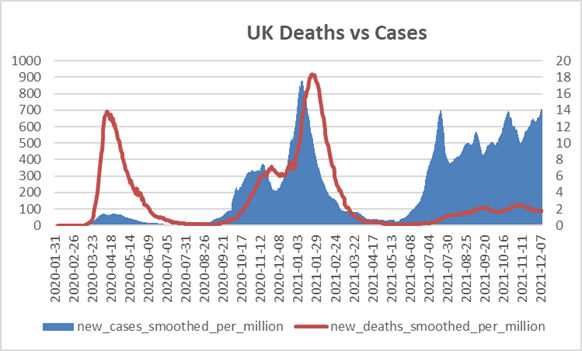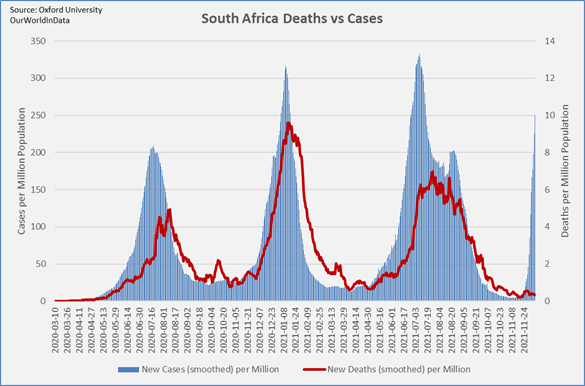Say No To Vaccine Mandates
President Ramaphosa’s confirmation that vaccine mandates are being considered by the government raises legal, ethical and scientific questions. It contravenes both Ramaphosa’s assurance in February 2021 that no-one would be forced to take the jab, and the Bill of Rights.
Section 12 of the Bill of Rights enshrines the right to “control over [one’s] body”. Limitation of this basic freedom demands extremely rigorous justification, as noted by Kenneth Meshoe (African Christian Democratic Party), who compared forced vaccination to rape. Such comparisons, if controversial, highlight two important facts. Firstly, the highly intrusive nature of forcible injection – by definition, an invasion of the body. Secondly, that negative perceptions of forced vaccination are likely to deepen levels of public distrust. A survey in August suggested that 48% of white South Africans and 25% of black South Africans were unwilling to receive vaccination: a sizeable number of citizens to potentially alienate.
Vaccines safe to choose
The evidence is overwhelmingly strong that vaccines have low risks and life-saving benefits when taken by most adults that have not previously been infected by SARS-CoV-2 (SARS-2), especially the elderly and those with comorbidities. The Institute of Race Relations (IRR) has incentivised all its staff that have not been previously infected to get vaccinated before meeting in person, with unanimous staff approval.
However, Covid-19 vaccines are currently non-sterilising, meaning that vaccinated people can still get infected with SARS-2 and pass on the viral infection. Since the beginning of 2021 the scientific consensus has been that “Zero-Covid” is not practically achievable, and amounts to little more than a “beautiful dream”, as summarised after a survey of scientists by the journal Nature. The purpose of vaccination therefore cannot be to eliminate SARS-2 or stop it from mutating in the future. The primary purpose of vaccination is for at-risk people to reduce their own chances of serious illness and death, a good basis for persuading people to manage their own risks.
At a national level the UK offers a telling case study on what is possible after significant portions of the population get vaccinated. Since mid-August, at which point 70% were vaccinated, the UK celebrated “Freedom Day”, with all domestic Covid-19 restrictions lifted. Since then, the UK has had four months of daily case load, adjusted for population size, twice has high as South Africa’s currently spiking levels. Despite the extremely high cases in the UK there have been subdued deaths, on average 2 per million population per day, reducing the national Covid-19 priority and allowing the country to address other urgent concerns concurrently. This is more or less what “endemic Covid-19” looks like.

The Power of Recovery
South Africa is in a very different position to the UK, since their vaccination rate (adults fully vaccinated) is almost three times higher than South Africa’s. However, Discovery estimated in mid-August that up to 80% of South Africans had been infected, while scientific studies show that the natural protection survivors enjoy is more durable and robust than protection from vaccines (while coming sadly at a higher cost)*.
IRR head of campaigns Gabriel Crouse therefore predicted in October** that the most likely outcome of South Africa’s fourth wave would be very high case numbers but subdued deaths compared to earlier waves. This prospect remains not simply a “beautiful dream” but something that incoming data tentatively supports.

While South African death rates are sure to climb, notice that they would have to climb by a factor of seven from current rates to reach levels that the UK could tolerate under their “Freedom Day” third wave.
The Omicron variant is demonstrably able to escape immune protection partially among the vaccinated and the recovered, but there is currently no evidence to suggest that it causes greater morbidity or mortality, and tentative evidence to suggest the opposite.
More investigation should be done on this, but unfortunately the government has little incentive to test whether Discovery’s estimates were accurate, since if they confirmed that South Africa did have the highest viral spread in the world leading into August 2021 (80% would be an international record) that would humiliate efforts by the National Coronavirus Command Council to “flatten the curve” by, inter alia, banning the sale of hot food, open-toed shoes, cigarettes, and alcohol, and banning South Africans from leaving their homes after midnight for almost two years, amongst other heavy regulations with apparently no helpful effect.
The power of recovery should be further investigated, regardless of how embarrassing it may be to the “Command Council”. In November 2021, TheLancet* published a meta-analysis of several studies, revealing that, “Some people who have recovered from COVID-19 might not benefit from COVID-19 vaccination. In fact, one study found that previous COVID-19 was associated with increased adverse events following vaccination with the Comirnaty BNT162b2 mRNA vaccine (Pfizer–BioNTech).”
In Switzerland the government considers someone who recovered from Covid-19 as good as vaccinated (if not better) for at least twelve months.
Black Market
Forced vaccinations will likely lead to a black market in fake vaccination cards, further stoking corruption that has taken hold during South Africa’s pandemic response. The Digital Vibes scandal has not resulted in any prosecutions, and the growth in the illicit cigarette trade in 2020 when tobacco sales were banned sets an alarming precedent, as this has not resulted in significant prosecutions either. In the climate of relative impunity for those who break the law, with most people so far refusing to be vaccinated, there is a high risk that government bureaucrats will be unable to resist the temptation to issue fake vaccine cards to those who choose not to get vaccinated but aim to avoid coercive measures, in exchange for bribes.
The Power of Persuasion
The use of coercion will entail abandoning persuasion (i.e. education on vaccines and the creation of fora for reasoned debate) – the democratic approach to addressing vaccine hesitancy. Discarding persuasion in favour of authoritarianism carries wider social implications. It requires citizens to accept a new paradigm for their participation in society, one which discourages discussion and legally enforces conformity. This is antithetical to liberal principles, which are not simply a garment to be worn in one arena and discarded in others. If we adopt this paradigm in relation to vaccines, we must accept the precedents it will set and the direction of state encroachment it will facilitate. These will be far-reaching.
Conclusion
Taking the legal, scientific and ethical considerations into account, it is clear that vaccine mandates are premature and potentially dangerous.
* https://doi.org/10.1016/S1473-3099(21)00676-9
** https://dailyfriend.co.za/2021/10/14/what-does-the-end-of-the-covid-19-pandemic-look-like/
https://www.news24.com/news24/columnists/guestcolumn/opinion-gabriel-crouse-omicron-variant-monster-or-mouse-20211204